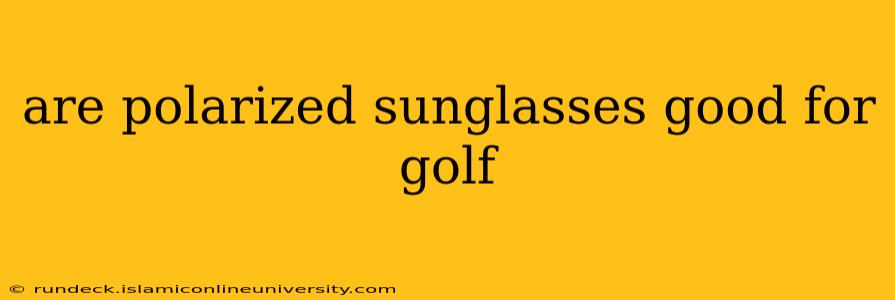Are Polarized Sunglasses Good for Golf? A Comprehensive Guide
Golfers often spend hours under the sun, making eye protection crucial. Polarized sunglasses are a popular choice, but are they the best option for the game? The short answer is: it depends. While they offer significant advantages, there are also some potential drawbacks to consider. This guide will delve into the benefits and drawbacks, answering common questions surrounding polarized sunglasses and golf.
What are the benefits of polarized sunglasses for golf?
Polarized lenses are designed to reduce glare by filtering out horizontally reflected light. This is particularly beneficial on the golf course, where sunlight reflecting off water hazards, sand traps, and even the fairway can significantly impair vision. By reducing glare, polarized sunglasses enhance:
- Improved contrast: This allows you to see the subtle undulations and contours of the greens more clearly, helping with accurate putting. You'll also be able to better judge distances and identify hazards more easily.
- Reduced eye strain: Less glare means less strain on your eyes, leading to improved comfort and focus throughout your round. This is especially beneficial on bright, sunny days.
- Enhanced depth perception: Polarized lenses can help improve your depth perception, which is critical for judging shot distances and assessing the lie of the ball.
- Better color perception: Some golfers find that polarized lenses improve color perception, making it easier to identify greens and hazards.
What are the drawbacks of polarized sunglasses for golf?
While the benefits are substantial, there are a few potential downsides to consider:
- LCD screens: Some golfers report difficulty reading LCD screens on golf carts or scorecards while wearing polarized sunglasses. The polarization can interfere with the LCD's liquid crystal display, causing distortion or making the screen difficult to read.
- Certain types of GPS devices: Similar to LCD screens, the polarization can interfere with some GPS devices. However, many newer devices are less affected.
- Cost: High-quality polarized sunglasses tend to be more expensive than non-polarized options.
Can polarized sunglasses affect my ability to see the golf ball?
This is a common concern. High-quality polarized lenses shouldn't significantly affect your ability to see the golf ball. However, very dark lenses can make it slightly harder to track the ball's flight, especially in low-light conditions. Choosing lenses with appropriate tint and transmission levels is key.
What type of lenses are best for golf?
The ideal lens type depends on individual preferences and playing conditions. However, generally, lenses with a light to medium tint are preferred for golf to maintain sufficient visibility while effectively reducing glare. Consider lenses that offer good UV protection as well.
Are there alternatives to polarized sunglasses for golf?
Yes, there are other options for eye protection on the golf course, including non-polarized sunglasses with UV protection or even specialized golf eyewear designed to enhance contrast and reduce glare without polarization. The best choice will depend on your individual needs and preferences.
Should I wear polarized sunglasses for every golf round?
Not necessarily. On overcast days or in low-light conditions, polarized lenses may not be as necessary. Having multiple pairs of sunglasses—one polarized and one non-polarized—allows for flexibility depending on weather conditions.
In conclusion, polarized sunglasses can offer significant advantages for golfers by reducing glare, improving contrast, and enhancing depth perception. However, it's essential to weigh the potential drawbacks, such as LCD screen interference, and choose lenses with appropriate tint and UV protection. Ultimately, the best choice depends on your personal preferences and playing conditions.
